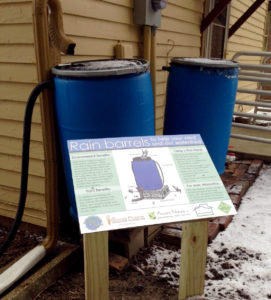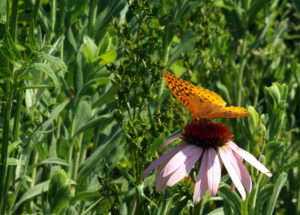The Freshwater Facts
To illustrate how important and how limited a resource freshwater is in our world, consider the following. More than 70 percent of the Earth’s surface is covered by water, but only 2.5% of this supply is considered fresh water. The rest is found in the form of salt water in the oceans. Of the fresh water that exists, most is locked up in glaciers and ice caps. Water can also be found in the form of clouds and humidity in the soil. That leaves us 3/10 of 1 percent found in the form of lakes, rivers and streams. Unfortunately, much of this small amount of freshwater is in danger of drying up through desertification or becoming so contaminated that it cannot be used for human consumption. Changing our habits of water use can help to abate this growing problem.
Why Harvest Rainwater with Rain Barrels?
 Besides helping the environment, an obvious reason for harvesting rainwater is to save money. Depending on the size of your house and the amount of rainfall in your area, you can collect a substantial amount of rainwater with a simple system. This extra water can have a significant impact on your water bill. The use of rainwater combined with the domestic use of grey water can further increase your savings. Even if you live in a rural area and have your own well, the fact that rainwater is a naturally soft water may be enough to justify harvesting rainwater.
Besides helping the environment, an obvious reason for harvesting rainwater is to save money. Depending on the size of your house and the amount of rainfall in your area, you can collect a substantial amount of rainwater with a simple system. This extra water can have a significant impact on your water bill. The use of rainwater combined with the domestic use of grey water can further increase your savings. Even if you live in a rural area and have your own well, the fact that rainwater is a naturally soft water may be enough to justify harvesting rainwater.
Rainwater stored in rain barrels has many uses. Some people find it mostly useful for watering their landscapes and gardens. Others find uses within the house as well. Rainwater can also be used for drinking but requires special treatment with a filtration system. Note that many cities require the filtration system for drinking water to be certified and the water to be tested on a regular basis. You do not need a filtration system for landscape uses. You can use it directly from your rain barrel on your garden.
Rainwater from Rain Barrels Makes Your Garden Smile
Since the rain water is usually collected from the roofs of houses, it picks up very little contamination when it falls. You’ll of course want to keep your roof clean of debris and potential contaminants to maximize purity. The material your roof is made of is also important in how much contamination the water will carry. Learn more about safe rainwater harvesting catchments. The chemicals and hard water from many of our municipal water systems can produce an imbalance in the soil of your garden. Chemical fertilizers, fungicides, pesticides, and drought can also disrupt the balance and harmony of the soil. This imbalance causes trees and plants to weaken and makes them more susceptible to disease.
Trees and plants have an efficient immune system that allows them to fend off diseases and other invaders as long as they have a healthy soil environment and are not stressed by other factors such as drought. Trees and plants rely on fungus, bacteria, and nematodes to help them absorb the minerals and nutrients they need. Trees and plants depend on a fungal root system called mycorrhizae. Mycorrhizae attaches itself to tree and plant root hairs and extends the root hair system.
Mycorrhizae uses some of the plant’s energy, but provides the plant with minerals it cannot otherwise absorb. In healthy soil, the mycorrhizae of one tree connects with mycorrhizae of other similar trees. When you look at your garden, visualize it as a vast interconnected community of trees, plants and tiny critters that live in the soil, all interacting and affecting each other. Thus, the type of water you use in your garden will affect the health of this intricate community.

And speaking of community, one of the best reasons to start harvesting rainwater is that if you teach and encourage others to do the same, you will help to spread the culture of rainwater collection and in turn help your community and the environment. It is always important to remember that every living thing on the planet needs water to survive so we as humans must expand our idea of community to the plants and animals that surround us.
